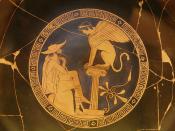Men of Thebes: look upon Oedipus.
This is the king who solved the famous riddle
And towered up, most powerful of men.
No mortal eyes but booked on him with envy,
Yet in the end ruin swept over him.
The first half of the ending of the Sophocles shows the rising action, climax and the falling action of the tragedy. It implies the definition of tragedy: One of high station due to a flaw (Hamatia) in Oedipus' character meets his demise. When Thebes is terrorized by the monster - Sphinx (a hybrid creature, with the lion's body, woman's head, eagle's wings and serpent's tail), who destroys all who cannot solve her riddle, Oedipus comes and rescues them from the miserable fate. Thebes welcomes her savior and offers him the vacant job of ruler, and the hand of Laius' widow, Jocasta, as an extra reward. Oedipus, with great insight is an excellent ruler who anticipates his subjects' needs.
When the citizens of Thebes beg him to do something about the plague, for example, Oedipus is one step ahead of them--he has already sent Creon to the oracle at Delphi for advice. Oedipus is a hero with intelligence, confidence and strong wills. However, it is his temper, overweening pride, blindness and stubbornness in pursuing the truth that bring about his tragic discovery that he has killed his father and married his mother. Oedipus' traits which gave him riches and power ultimately led to his tragic ending.
Let every man in mankind's frailty
Consider his last day; and let none
Presume on his good fortune until he find
Life, at his death, a memory without pain.
In the second part of the ending, Choragos is warning us that mankind are so fragile and are so helpless in...


